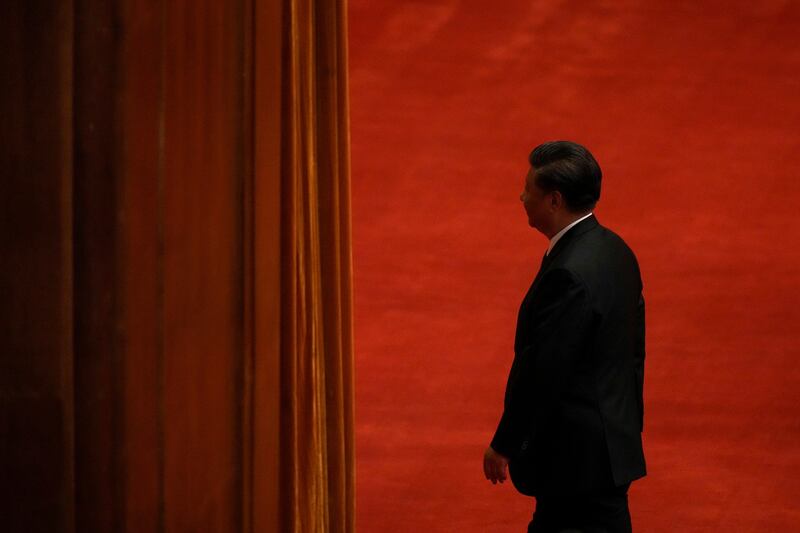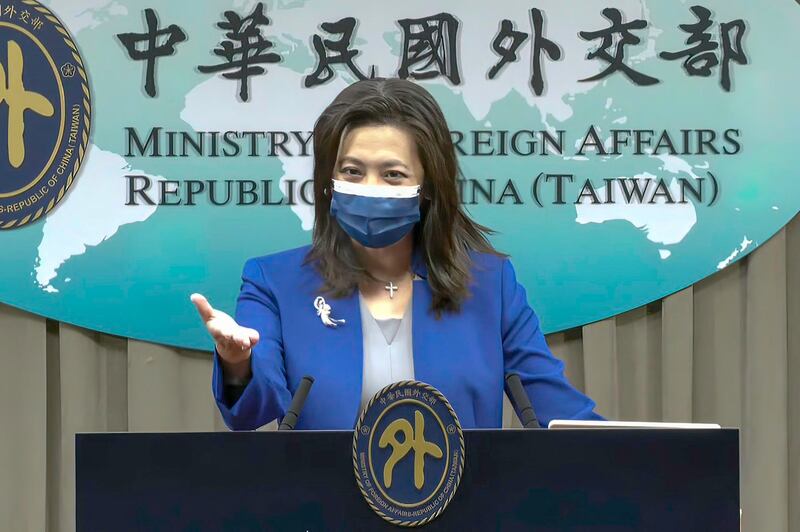UPDATED at 02:51 p.m. EST on 2022-07-29
U.S. House Speaker Nancy Pelosi on Friday remained tightlipped about a possible trip to Asia that is reported to include the democratic island of Taiwan, a day after Chinese President Xi Jinping warned Washington against provoking his nation over the issue in a phone call with U.S. President Joe Biden.
“I don’t ever talk about my travel because, as some of you know, it’s a security issue,” Pelosi told a media briefing when asked what message she would like to send to the international community by leading a congressional delegation on a tour of Asia, which reports say could begin on Friday.
“The President, earlier in his term, talked about a strong emphasis on the Asia-Pacific … and we want the Congress of the United States to be part of that initiative … I’m very excited, should we go, to the countries you’ll be hearing about along the way.”
Pelosi noted that in May, the U.S. House of Representatives hosted nine leaders of the Association of Southeast Asian Nations (ASEAN) during their trip to meet with Biden in Washington and said that lawmakers want to remain engaged with the region.
“We have global responsibilities when it comes to three things: security, economy, and governance. And [a possible trip] will be part of that,” she said.
As she left the podium, Pelosi was asked about whether she planned to travel to Taiwan as part of a trip to Asia and about Xi Jinping’s comments during his phone call with Biden on Thursday, but she did not respond. Neither the U.S. government nor Pelosi’s office has confirmed the news, but Biden recently indicated that the military “did not think it was a good idea right now” for the House speaker to visit Taiwan.
CNN reported that Pelosi plans to depart Friday for a tour of Asia, though whether she stops in Taiwan remains uncertain, citing a person familiar with the plans. The trip includes stops in Japan, South Korea, Malaysia and Singapore, the report said.
But a visit to the self-governing island of Taiwan, which Beijing calls a “runaway province,” would raise tensions across the strait at a time when U.S.-China relations are at a low.
On Thursday, Xi warned Biden to avoid "playing with fire" on the issue of Taiwan during a two-hour call — their fifth as heads of state — urging his counterpart to refrain from interfering in Beijing's "national sovereignty and territorial integrity," according to a readout by the official Xinhua news agency.
Biden, for his part, made clear that Washington “strongly opposes unilateral efforts to change the status quo or undermine peace and stability across the Taiwan Strait,” according to a White House press release about the call.
While the U.S. does not have official relations with Taiwan and recognizes Beijing diplomatically, rather than Taipei, as part of the so-called “one-China policy,” Washington is obligated by law to provide the island with defense capabilities. Lawmakers have called on the Biden administration to take a stronger stance on Taiwan.
China has already responded strongly against the rumored trip, with a PLA spokesman threatening that should Pelosi insist on making the visit, "the Chinese military will never sit idly by, and will certainly take strong and resolute measures" to retaliate. On Friday, China announced three almost-simultaneous military exercises in the South China Sea between July 27 and 31, just as reports emerged that Pelosi may embark on her Asia-Pacific tour the same day.
While the two leaders spoke on the phone on Thursday, Pelosi and U.S. Representative Thomas Suozzi of New York met with Uyghur activists in Washington to discuss their advocacy work on behalf of members of their ethnic group in northwestern China’s Xinjiang region. Chinese authorities are believed to have detained up to 1.8 million Uyghurs and other Turkic minorities in internment camps in the region since 2017 as part of what the U.S. and several Western parliaments have called a campaign of genocide, and the issue is a regular source of tension in U.S.-China relations.

Little genuine consensus
Analysts told RFA on Friday that while both the U.S. and China talked up Thursday's call between Biden and Xi, there was there was little genuine consensus between the two leaders.
Beijing-based political commentator Wu Qiang said the tone of the call showed that China and the United States increasingly lack any basis for cooperation and stability.
"For U.S. President Biden, their fifth call was just his attempt to build guard-rails for China-U.S. relations," Wu said. "The problems, disputes, inflation and other geopolitical issues that Biden is facing now at home are very important."
"The [deterioration in] the relationship between China and the U.S. is going to be difficult to alleviate through dialogue," he said.
However, the call held considerable political significance for Xi in the context of domestic politics, Wu said.
"What this shows is that the stability of Sino-U.S. relations is very important in the run-up to the CCP's 20th National Congress, and to [Xi's bid for a third term in office]," he said.
"For the dialogue to take place against this background shows that the Chinese leadership is very concerned about Sino-U.S. relations ... There is a sense of anxiety," Wu said.
The presidential phone call didn't appear in top searches as ranked by the internet platform Sina on Friday, but the Chinese defense ministry's opposition to Pelosi's plan was in seventh place.
Wu said the promise to force Taiwan to "unify" with China, using military force if necessary, is likely a key part of Xi's bid for an unprecedented third term in office, for which he needs to build considerable internal support.
"This is, of course, a key political goal for the regime over the next 5 to 10 years, and the outbreak of war [in Ukraine] has made it less likely that China will be trying to [achieve this] in a favorable international environment," he said.
Zong Tao, a former editor at International News, said the call was definitely an attempt to prevent any possible escalation of tensions in the Taiwan Strait.
But he didn't think it would make much difference to actual, real-world outcomes.
"The contradictions -- be they economic or trade-related, or security-related -- can't be easily resolved," Zong told RFA. "They probably can't get to any kind of valuable consensus."
"Both leaders understand each others' thinking, but that won't make much difference to the way the situation will actually develop," he said, adding that the likelihood of military conflict continues to grow.

Media coverage
Party mouthpiece The People's Daily ran the approved Xinhua news agency report on the call, repeating Xi's warning to Biden not to "play with fire" over possible plans by U.S. House Speaker Nancy Pelosi to visit the democratic island of Taiwan.
The English edition of the nationalistic Global Times newspaper said Washington is trying to "contain" China with the passage of the CHIPS + Science Act -- which Biden has said is aimed at strengthening national security by making the U.S. less dependent on foreign sources of semiconductors.
"A bigger storm is also brewing as U.S. House Speaker Nancy Pelosi is plotting to visit the Taiwan island. Washington is fully aware of the severity of this issue," the paper said in an op-ed article on Friday, describing the phone call as "reassuring ... to some extent," but also "extremely critical for both China-U.S. bilateral ties and for the world."
Taiwan, which has never been ruled by the CCP, nor formed part of the People's Republic of China, has repeatedly said it won't give up its democratic way of life or sovereignty despite the threat of Chinese invasion.
Beijing insists its diplomatic partners break off ties with Taipei and agree not to treat the island like a sovereign nation, hence the objection to Pelosi's potential trip.
The Global Times said Biden's reassurances that Washington will continue to support its "one China" policy, referring to China's territorial claims over Taiwan, were "relatively positive."
"But ... these positive statements by President Biden have not been translated into the U.S.' practical actions," the paper said.
Taiwan foreign ministry spokeswoman Joanne Ou told reporters on Thursday that her government has yet to hear from Speaker Pelosi's office regarding the details of any stopover in Taiwan during her planned trip to Japan, Indonesia and Singapore in August.
"Actually, our attitude is the same as before, which is that we have no comment," Ou said. "Invitations to U.S. congressmen and women to visit [Taiwan] have always been a long-term focus of the Ministry of Foreign Affairs and our representative office in the U.S., but we do not comment on individual cases."
"The Ministry of Foreign Affairs hasn't received any exact details regarding Speaker Pelosi's visit to Taiwan, and we have no further comment or explanation to offer," she said.
Translated and edited by Luisetta Mudie.
Updated to include Pelosi's comments on a possible trip to Asia.
